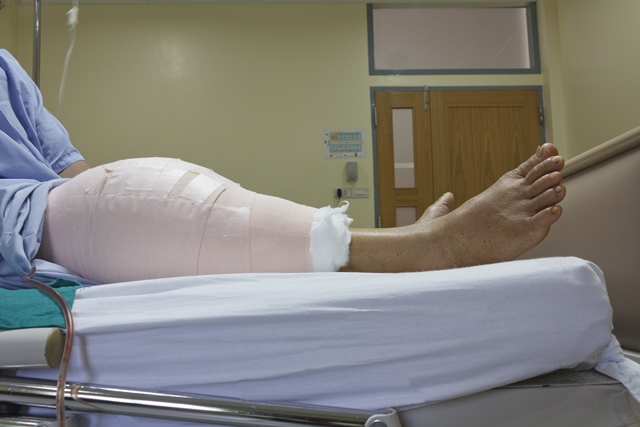By Kevin Calcagnie on November 24, 2015 -

Whitlow v. Rideout Memorial Hospital, (Third District, June 9, 2015) 237 Cal.App.4th 631, 188 Cal. Rptr.3d 246, 15 Cal. Daily Op. Serv. 5902, 2015 Daily Journal D.A.R. 6373.
The children of a woman who died from a massive brain hemorrhage two days after being treated for a headache at a hospital emergency room, filed an action for medical malpractice against the hospital. The plaintiffs alleged that the physician, who was an independent contractor, was an ostensible agent of the hospital, and that his negligence was a cause of their mother’s death.
The hospital moved for summary judgment, contending that as a matter of law it could not be held liable for the acts of the physician, and provided evidence that the decedent had signed a “Conditions of Admission” form, which provided that “[a]ll physicians and surgeons furnishing services to the patient, including the radiologist, pathologist, anesthesiologist and the like, are independent contractors and are not employees or agents of the hospital.” The defendant also provided evidence that there was a sign on the wall of the registration area of the emergency department that stated: “Emergency physician services will be billed to you separately from the hospital’s services,” and that the insignia on the clothing the doctor was wearing while treating the decedent identified him as an employee of “California Emergency Physicians.”
The trial court granted the motion for summary judgment, finding that, as a matter of law, the emergency room physician was not the ostensible agent of the hospital. However, the court of appeal reversed, holding that triable issues of fact existed as to the question of ostensible agency: Read the rest »
By Kevin Calcagnie on September 28, 2015 -

Phyllis Keys v. Alta Bates Summit Medical Center (1st Dist., February 23, 2015/March 25, 2015) — Cal.Rptr.3d. —-
The sister and daughters of a woman who died following thyroid surgery, filed an action for wrongful death against the medical centerwhere the surgery was performed. One of the daughters and the decedent’s sister also asserted a cause of action for negligent infliction of emotional distress, alleging that immediately following surgery both had witnessed the decedent having respiratory difficulties and discomfort, and both were upset at what they believed was a lack of urgency in responding to the woman’s distress.
Following a jury verdict in favor of the plaintiffs the defendant appealed, contending there was no evidence to support the jury’s finding that the plaintiffs had meaningfully comprehended the medical negligence that led to the death of their family member at the time the negligence was occurring. Relying on Bird v. Saenz (2002) 28 Cal.4th 910, 123 Cal.Rptr.2d 465, 51 P.3d 324, the defendant argued that the plaintiffs could not meaningfully perceive the defendants’ negligence because except in the most obvious cases, a misdiagnosis is beyond the awareness of lay bystanders.
However, the court of appeal affirmed, holding that the injury producing event was the defendant’s lack of acuity and response to the decedent’s inability to breathe, a condition the plaintiffs observed and were aware was causing her injury: Read the rest »
By Kevin Calcagnie on September 24, 2015 -

Uriell v. Regents of University of California (4th Dist., January 29, 2015) 234 Cal.App.4th 735, 184 Cal.Rptr.3d 79, 15 Cal. Daily Op. Serv. 1788, 2015 Daily Journal D.A.R. 2028
The family of a woman who died as a result of breast cancer filed an action for medical malpractice against Regents of the University of California. The plaintiffs alleged that the decedent’s physicians at the UC San Diego Medical Center had failed to timely diagnose her cancer in 2007, resulting in her death in 2010, but that had she been timely diagnosed she would have survived ten more years.
Following a jury verdict in favor of the plaintiffs the defendant appealed, contending that the trial court had failed to properly instruct the jury on the issue of causation when it gave the standard jury instructions on substantial factor (CACI 430) and multiple causes (431), without a special instruction the defendant had requested, stating: “Causation must be proven within a reasonable medical probability based upon competent expert testimony. Mere possibility alone is insufficient to establish a prima facie case.”
The court of appeal affirmed, rejecting the defendant’s argument that the standard instructions confused the jury or diluted the standard for causation in a medical malpractice case: Read the rest »
By Kevin Calcagnie on August 31, 2015 -

Blevin v. Coastal Surgical Institute, — Cal.Rptr.3d —-, 15 Cal. Daily Op. Serv. 310, 2015 Daily Journal D.A.R. 383
A patient who developed a bacterial infection after knee surgery as a result of contaminated surgical equipment filed an action for medical malpractice against the surgical facility where the surgery was performed. The defendant contended that the action, which was filed over 15 months after the surgery, was barred by the one-year limitations period of Code of Civil Procedure section 340.5. In opposition, the plaintiff argued that because the defendant had paid for his medical expenses incurred in treating the infection when he was not represented by counsel, and had not advised him of the statute of limitations, the statute was tolled under Insurance Code Section 11583.
The trial court ruled that section 11583 tolled the one-year statute of limitations and the court of appeal affirmed, holding in a case of first impression that that the tolling provisions of section 11583 apply to the one-year limitations period for medical malpractice actions: Read the rest »
By Kevin Calcagnie on March 9, 2015 -
Snibbe v. Superior Court, (Second District, February 27, 2014) 224 Cal.App.4th 184, 168 Cal.Rptr.3d 548, 14 Cal. Daily Op. Serv. 2156, 2014 Daily Journal D.A.R. 2450
The sons of a woman who died following hip replacement surgery filed an action for wrongful death against a medical center, the physician who performed the surgery, and the anesthesiologist. The plaintiffs alleged that the decedent was found unresponsive several hours after a physician’s assistant administered hydromorphone, a pain medication which presents a high risk of fatal respiratory depression. The plaintiffs further alleged that administration of hydromorphone for postoperative pain relief was below the standard of care and a substantial factor in the death of the decedent.
The plaintiffs moved to compel production of postoperative orders relating to the physician’s other patients, contending that they would be relevant to the issue of whether the physician and his assistant regularly consulted with an anesthesiologist, (as the physician had testified), or instead, he regularly permitted the assistant to rely on boilerplate drug orders for the administration of opioid pain medication.
The trial court granted the motion, but limited the scope of discovery to 160 postoperative orders including provisions for the administration of opioids. The physician sought a writ of mandate, contending that production would violate the physician-patient privilege. The court of appeal issued a writ ordering the trial court to issue a new order redacting personal identifying information from the records, but denying the petition in all other respects:
Read the rest »
By Kevin Calcagnie on December 29, 2014 -
Maher v. County of Alameda, (First District, February 18, 2014) — Cal.Rptr.3d —-, 2014 WL 605904
A man who suffered severe complications from a temporary biliary stent which had been inadvertently left in his abdomen following surgery, filed suit against the physicians who had performed the surgery and the medical center. The plaintiff alleged that he was unaware of the presence of the stent, which should have been explanted after 3 to 6 months, until 14 years later when it began to disintegrate and migrate.
The defendants demurred to the complaint, contending that the action was barred by Code of Civil Procedure section 340.5, which provides that in an action for injury or death against a health care provider based upon professional negligence, the time for the commencement of action shall be three years after the date of injury or one year after the plaintiff discovers, or through the use of reasonable diligence should have discovered, the injury, but in no event exceeding three years. The plaintiff opposed the demurrer, arguing that the statute had been tolled by the “foreign body” exception in the statute which provides for a tolling in the event of “the presence of a foreign body, which has no therapeutic or diagnostic purpose or effect, in the person of the injured person.”
Read the rest »
By Kevin Calcagnie on May 30, 2013 -
Yun Hee So v. Sook Ja Shin, HP, (Second District, January 3, 2013) 212 Cal.App.4th 652, 151 Cal.Rptr. 34d 257, 13 Cal. Daily Op. Serv. 168, 2013 Daily Journal D.A.R. 153
A woman who awoke while under anesthesia during a D & C procedure following a miscarriage, filed an action against the anesthesiologist as well as the hospital, asserting various theories including negligence, assault and battery and intentional infliction of emotional distress. The plaintiff alleged that after the procedure while she was in the recovery room, she had questioned the anesthesiologist as to why she had awakened, and that the defendant became visibly upset and angry, left the room and returned with a container of “blood and other materials.” The plaintiff further alleged that the defendant was angry that she had questioned her competence, motioned as if she would drop the container in the plaintiff’s lap, and then touched her hands, arms and shoulders, causing her to sustain severe emotional distress.
Read the rest »
By Kevin Calcagnie on June 11, 2012 -
Scharer v. San Luis Equine Hospital, Inc., (Fourth District, February 28, 2012) — Cal.Rptr.3d —- ; 2012 WL 661684
The owner of a show horse which required euthanasia following surgery filed an action for malpractice against a veterinary hospital and three veterinarians. The defendants moved for judgment on the pleadings based upon the fact that the complaint had been filed 17 days beyond the one year statute for veterinary malpractice provided in Code of Civil Procedure § 340(c). The plaintiff opposed the motion, arguing that the because she had sent a pre-lawsuit notice of intent to sue under § 364, which requires such notice in actions against health care providers in certain professional negligence cases, the statute should have been extended an additional 90 days.
The trial court granted the motion, finding that the notice provisions of § 364 are not applicable to property damage claims. The court of appeal affirmed, rejecting the plaintiff’s contention that the statute was equitably tolled by the notice of intent to sue: Read the rest »
By Kevin Calcagnie on April 17, 2009 -
Van Horn v. Watson, (Supreme Court of California, December 18, 2008) 197 P.3d 164, 45 Cal.4th 322, 197 P.3d 164, 86 Cal.Rptr. 3d 350, 08 Cal. Daily Op. Serv. 15,199, 2008 Daily Journal D.A.R. 18,512
A woman who was injured in a motor vehicle collision filed suit against an acquaintance who had pulled her from the vehicle following the collision. The plaintiff alleged that she had only suffered an injury to her vertebrae, but that by dragging her out of the vehicle the defendant had caused permanent damage to her spinal cord, rendering her a paraplegic.
The defendant moved for summary judgment based upon Health & Safety Code section 1799.102, which provides that no person who in good faith, and not for compensation, renders emergency care at the scene of an emergency shall be liable for any civil damages resulting from any act or omission. The trial court granted summary judgment but the Court of Appeal reversed, finding that the defendant’s actions at the scene did not amount to the rendering of emergency care within the meaning of the statute.
The California Supreme Court affirmed the judgment of the Court of Appeal, holding that the Legislature intended for section 1799.102 to immunize only those persons who in good faith render emergency medical care: Read the rest »
 RSS
RSS



 Los Angeles
Los Angeles